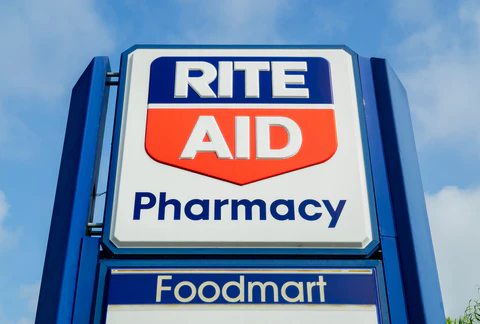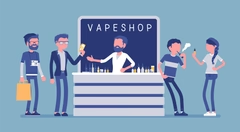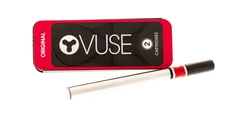Currently Empty: $0.00
On April 11th, the giant pharmacy chain Rite Aid announced that it will no longer be carrying electronic cigarettes or other vaping products in any of its 2,400 stores. The company said that it will be slowly discontinuing the products over the next 90 days. However, Rite Aid will still continue to sell combustible cigarettes, a decision which certainly raised more than a few eyebrows.

The reason cited for the change was the “surge in teen vaping” over the past year as reported by the FDA.
“We’re concerned about some of the alarming statistics regarding the use of e-cigarettes and vaping products by children and teens,” said Rite Aid CEO Bryan Everett. Everett did concede that “many feel these products are beneficial to those of legal age who are trying to quit the use of tobacco,” but, nonetheless, the company has decided to discontinue sale out of concern for rising use among middle and high school students.
The move will certainly reduce choice and availability for adult vapers. Some people live in rural areas where retailers who carry vaping products of any kind are scarce–vaping deserts if you will. For these people, losing Rite Aid as a source could definitely make life more difficult.
On the other hand, if Rite Aid opts out, it may have the positive consequence of sending business back to vape shops. While this won’t help vapers who live in rural areas where there are no vape shops, it could be beneficial to vapers as a whole.

Shifting the sale of vape products to vape shops has the advantage of better age verification. Because most vape shops only sell vaping related products, I.D. is often required at the door and vape shops generally do a better job of preventing sales to minors. When the FDA released a list of 329 businesses that had been caught selling vapor products to minors in 2017, not one of them was a vape shop. Even the ex-FDA Commissioner Scott “Epidemic” Gottlieb himself agreed.
“We’re looking at…whether or not flavored products on the market should be confined to adult vaping shops, which generally tend to do a better job of checking ID,” said Gottlieb.

Indeed, it was the big chain retailers who were largely responsible for bringing the wrath of the FDA down on the vapor world. Through undercover sting operations in the summer of 2018, the FDA found rampant violations of the prohibition against selling vapor and other tobacco products to minors. Shell, 7-Eleven and Chevron averaged a violation rate of between 25 and 34 percent of the stores inspected. Exxon, BP and Mobil clocked in between 35 and 44 percent.
Walgreens alone, one of Rite Aid’s direct competitors, racked up 1,800 separate violations across the country. In total, 22% of the approximately 6,350 Walgreens stores that the FDA inspected had violated the law.
“Both the rate of violations and sheer volume of violative inspections of Walgreens stores are disturbing, particularly since the company positions itself as a health-and-wellness-minded business,” said Scott Gottlieb, FDA Commissioner at the time.
“This cannot possibly come as a surprise to corporate leadership,” Gottlieb continued. “Ignoring the law and then paying associated fines and penalties should not simply be viewed as a cost of doing business.”
As much as we disagree with Scott “Epidemic” Gottlieb on most issues, we absolutely share his frustration here. It is grossly negligent and irresponsible, not to mention terribly destructive to the freedoms of vapers everywhere, for a company like Walgreens to so consistently fail to card minors trying to buy vape products. There’s simply no excuse.

One theory as to why vape shops may be more diligent at carding potentially underage customers is because they have a lot more at stake. Repeated violations can result in a No-Tobacco-Sale Order from the FDA. Such an order would close down a vape shop whereas a convenience store or Walgreens, which also carry many other products, would not feel the impact nearly as much.
Walgreens did in fact receive such an order from the FDA in February of 2019 as a result of the FDA’s summer 2018 sting operation. Circle K received one as well. The orders were “for repeated violations of restrictions on the sale and distribution of tobacco products, including sales of cigars and menthol cigarettes to minors.” The orders barred the two retail locations from selling tobacco products of any kind for a period of 30 days.

Given the extraordinarily high rates of violations the FDA found during its 2018 sting operation, it strikes us as surprising that the FDA issued only two such No-Tobacco-Sale Orders. The FDA has been warning about the rise in teen vaping, using it as a justification for threatening to take away flavored vapor products from every adult vaper in the United States. The single most effective thing the FDA could do to keep vapes out of teen hands would be to crack down mercilessly on illegal sales to minors by handing out No-Tobacco-Sale Orders like a meter maid on a bad hair day. Using the spiky side of the hairbrush to spank only two out of the thousands of violators uncovered by the FDA’s sting operation seems questionably lenient.
Rite Aid itself was found by the FDA to have a relatively better track record at abiding by the age verification laws. Only 9.6% of the Rite Aid locations the FDA inspected were found to be in violation. But given the flagrant behavior exhibited by Rite Aid’s competitors, we can’t blame Rite Aid for wanting to step out of the fray.
In addition to reducing the possibility of sales to minors, there’s another potentially positive effect of Rite Aid pulling vapor products. The products that find their way onto Rite Aid’s shelves are generally manufactured, owned or otherwise connected to Big Tobacco or large, publicly traded companies. Juul, Vuse, Mark Ten, Blu and Japan Tobacco’s brand Logic own 97% of the electronic cigarette market in the U.S. It is these companies that have the clout to command space on the shelves of a retail giant like Rite Aid. However, it is also these products that have created many of the problems the vaping community is now facing.

Over the last ten years we’ve watched the changes in the vaping world wrought by the shift from small businesses comprised of passionate individuals to giant vapor conglomerates who put profits over people. The results have been drastically reduced personalized support for new vapers, jacked up nicotine levels that in some cases may be actually fueling addiction, slick advertising, manipulation of public debate about vaping, heavily funded but skewed lobbying efforts made only to benefit a single company rather than vapers as a whole and all the other ills that come along with big business and Big Tobacco. Along with the increase in under age vaping, this shift has fueled the anti-vaping crusade that is currently threatening the rights of all vapers.
We see transferring the flow of e-cig purchases back to specialized vape shops that more responsibly card customers and away from Big Tobacco as a potential positive upside to Rite Aid’s announcement. Keeping vaping products out of the hands of minors is critical, not only to prevent early life addiction to nicotine, but also to reverse the kind of hysterical scrutiny that vaping is currently being subjected to, the results of which now threaten the choices of every adult vaper. So maybe losing Rite Aid as a purveyor of vape products isn’t all bad.
But, hey, with all the bad news we’re all constantly surrounded with, sometimes we just like to look for ways to see the glass as half full. : )

Try our premium organic vape juice today!
